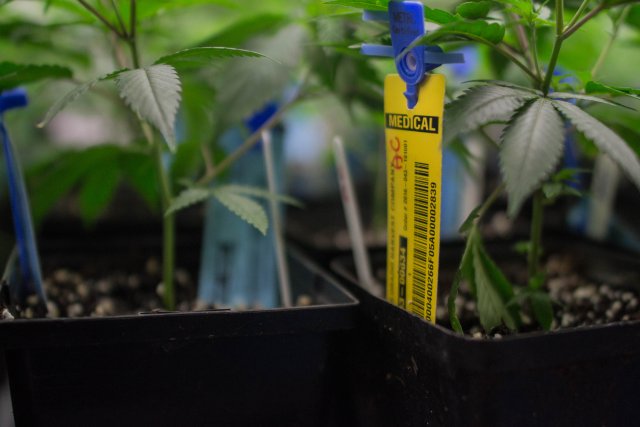
Oklahoma’s seed-to-sale program is back in business following a Feb. 25 ruling by Oklahoma County District Judge Natalie Mai. But there is still plenty of work to be done to implement the system, according to Rep. Scott Fetgatter (R-Okmulgee).
Seed-to-sale is the state’s tracking program that follows the lives of marijuana plants. The process of tracking and tracing the lifespan of a marijuana seed or plant begins when a viable plant is given an RFID tag that contains information about its early life. That tag, in effect, serves as a profile for each plant and its yield throughout the cultivation, processing and distribution processes.
But last year, some marijuana producers filed a class-action lawsuit to stop the process because they believed the language in state statute did not require them to use a specific vendor for their seed-to-sale tracking needs. The state selected Metrc as its vendor for RFID tags purchased by growers and the tracking software they are required to use, which costs $40. Metrc currently provides those services in at least 15 states and the District of Columbia, according to its website.
Key points of the settlement
The parties to the lawsuit reached a settlement agreement in February, with Mai outlining the details in her order:
- Licensed medical marijuana businesses have until Thursday, May 26, to comply with the Metrc seed-to-sale tracking system;
- Dispensaries have until Wednesday, Aug. 24 to sell or legally dispose of untagged medical marijuana products in their inventory;
- OMMA must conduct at least five online seminars by May 26 to educate licensees on the new seed-to-sale system;
- OMMA will ensure adequate call center staff is on hand to respond to questions about seed-to-sale program implementation.
“Lifting this injunction clears the single biggest roadblock to OMMA enforcing the law,” Oklahoma Medical Marijuana Authority executive director Adria Berry said in a statement. “This is a crucial step toward cracking down on licensees operating illegally or skirting the system within Oklahoma’s medical marijuana industry. Come May 27, we will focus the bulk of our enforcement authority on businesses that are not Metrc-compliant.”
Ronald Durbin and Beau Zoellner filed the lawsuit last year. They operate Dr. Z Leaf, a marijuana growing business in Okmulgee County. Zoellner told the Tulsa World on Feb. 25 that the partial settlement resolves some complaints while others are to be determined.
“Our goal is to help clearly outline a path to success for these people who originally signed up for the proper way of doing things, and really what the Oklahoma people originally voted for,” Zoellner said at a news conference following the ruling.
Durbin said issues with whether the cost of RFID tags will be reimbursed by the state remain unresolved.
“That is one issue that we reserved for future litigation and future resolution in the courts,” Durbin said.
‘I’m glad they settled the lawsuit’

First elected to the House of Representatives in 2016, Fetgatter has been involved in authoring much of the subsequent legislation affecting Oklahoma’s medical marijuana industry. He said the settlement of the lawsuit is a good step.
“My take has always been seed-to-sale is a good thing, and I’m glad they have settled the lawsuit,” Fetgatter said. “We need to get it implemented because it’s another tool to help us deter the black market sales in Oklahoma. But we have even more things we need to get done to make that a more viable system in helping track and trace marijuana.”
Fetgatter said there are still holes in the system that can allow for some products to slip through the gaps.
“Seed-to-sale is a great tool, but the system still doesn’t know how much weight a marijuana plant yields,” Fetgatter said. “A plant may yield a pound of marijuana, but if the user only inputs a half of a pound into the system, the rest can still be diverted to the black market.”
Fetgatter said adding other metrics into the seed-to-sale system could help prevent undercounted yields from marijuana plants. Energy usage, grow light counts and renderings of how a grow operation will look before it is licensed could help ensure that marijuana yields are not undercounted, he said.
Late Friday, Fetgatter and a pair of other House Republican members announced a press conference for 10 a.m. Monday, March 7, to unveil “the Oklahoma House Republican medical marijuana policy package.” The press conference is set to be streamed live on Facebook.
Related: From March 2021
‘A lot to keep track of’: OMMA’s seed-to-sale program coming to fruition





















